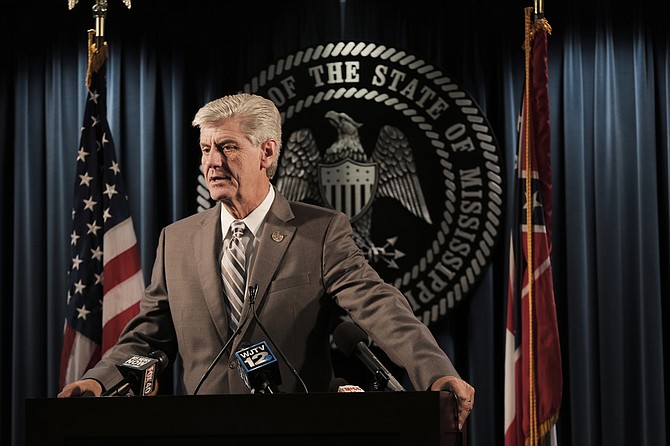Gov. Phil Bryant pointed to two months of state tax collections that exceeded forecasts, after months of revenue shortfalls that created the necessity for $170 million in midyear budget cuts this year, followed by more big cuts for the upcoming year. Photo by Imani Khayyam.
JACKSON, Miss. (AP) — Getting better or getting worse? That's the question Mississippi leaders are debating after the third major credit rating agency warned last week that it was concerned about weakness in state finances and the overall economy.
For credit rater Standard & Poor's Financial Services, the answer is "getting worse." The agency didn't downgrade Mississippi's credit rating last week, but did change its outlook on the credit rating to negative. That's a way of putting investors and the state on notice that a downgrade could be coming, if things keep going the way they are now.
"It's not a downgrade.... It's a warning," is how Gov. Phil Bryant put it to reporters Thursday.
Actually, if you read the S&P report closely, the agency said it could have cut Mississippi's credit rating from AA to AA-, citing increasing unfunded liability in the state pension system. But S&P chose not to, giving the state credit for good behavior in the past, citing Mississippi's "historical focus on a balanced approach to proactive budget adjustments."
But in addition to worsening underfunding in the Public Employees Retirement System, S&P also worried about slow economic growth and the expectation that state revenues will continue to decline as more tax cuts kick in. The rating agency said its analysis found more budget cuts would probably lead to fewer jobs in the state.
S&P said Mississippi does have some points in its favor, including a history of promptly reducing budgets when there are shortfalls, as well as a fair amount of money still in the state's rainy day fund. It also praised lawmakers' decision to hold back 1 percent of projected revenue in the budget that begins July 1. State law calls for a 2 percent set-aside each year, but lawmakers have suspended that requirement in most recent budgets. But S&P warns even that may not be enough.
"We believe the 1 percent budget margin provides limited buffer for midyear adjustments given recent revenue shortfalls and potential for further revenue volatility due to implementation of recent tax changes," the agency wrote.
S&P is the third of the three major credit rating agencies to voice concerns about Mississippi's financial trajectory. Fitch Ratings lowered Mississippi's credit rating by a notch in August. Moody's Investors Service issued a warning in July similar to S&P's action, cutting the outlook to negative but not lowering the credit rating. Lower credit ratings can mean a borrower has to pay more for a loan.
State Treasurer Lynn Fitch, a Republican, said S&P's pronouncement should be a call to action, echoing a downbeat approach she has taken to state borrowing and spending in recent years.
"That makes it all the more important that the Mississippi Legislature implement very prudent and very responsible fiscal policies when it comes to spending, taxing, and borrowing," Fitch said.
Bryant and Lt. Gov. Tate Reeves struck a sunnier tone, pointing to two months of state tax collections that exceeded forecasts, after months of revenue shortfalls that created the necessity for $170 million in midyear budget cuts this year, followed by more big cuts for the upcoming year.
"Necessary reductions have been made in the budget," Bryant told reporters. "Revenue numbers, for example, in March were $50 million more than projected. Think about that. I think in April they'll be $75 million more money than was projected. So those are remarkable numbers for just two months."
And while it's understandable that Bryant and Reeves would defend the policies they have made, even S&P said the negative outlook might not last forever.
"If the state is able to manage through scheduled tax cuts while maintaining good reserve and liquidity levels and structural budgetary balance, we could revise the outlook to stable."
Copyright Associated Press. All rights reserved. This material may not be published, broadcast, rewritten, or redistributed.



Comments
Use the comment form below to begin a discussion about this content.
comments powered by Disqus